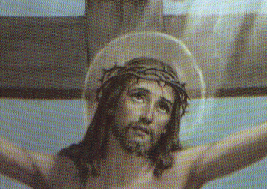
The new God's people
In the Gospels, Jesus rarely refers to the Church, whose greek term is "Ekklesìa". We find this word in two sentences mentioned in Matthew's gospel. We find the first sentence in Matthew 16,8, when Jesus solemnly exclaims:
"And I tell you, you are Peter, and on this rock I will build my church, and the powers of death shall not prevail against it" (Mt 16,18). Since this moment Simon the fisher will be called Kefa, Aramaic term which means rock, stone. And as in the Biblical world the names indicate the essence and mission of the person, the sentences above-mentioned shows Master's will to build, on this rock, on this stone, a spiritual building, whose greatness will exceed every geographical coordinate and whose duration goes longer the time. And for this, Jesus will say to his friends: "Here I am all days with you, till the end of the world"(Mt 28,20).
We find the second assertion in the chapter 18 of the same gospel: "If your brother sins against you, go and tell him his fault, between you and him alone. If he listen to you, you have gained your brother. But if he does not listen, take one or two others along with you, that every word may be confirmed by the evidence of two or three witnesses. If he refuses to listen to them, tell it to the church; and if he refuses to listen even the church, let him be to you as a Gentile and a tax collector" (Mt 18,15-17).
Two sentences, two passages, in which we find the term Church, which means "Ekklesìa", greek term mentioned by the "Seventy" to indicate the hebrew "qahal". This term means "assembly", "meeting", or "convocation". And perhaps just this hebrew term, "qahal", has been said by Jesus to speak about his new people, about new Alliance built by his blood.
But they are also other images with which the
Apostolic Community designates the Church. And when we speak of Apostolic
community, we intend the twelve that they have lived with Jesus for the whole
time of the public life; they have shared with him joys and pains; they have
assimilated his thought and his teaching, fully reach maturation after the
experience of the Easter, when they have deeply thought on what Jesus had
told them and taught.
Then, we have, reason to believe that in the teaching of the
apostles is present, even though in germinal way, the teaching of Jesus. And for
this that what Jesus has taught on the Church, we find it in the testimony
written of the apostles, in which the new People of God is seen in continuation
with the ancient people of the Hebrews and with various images. Those described
by Paul: the Church "God's Israel" (Gal 16,6), "God's temple" (1 Cor. 3, 17;
2Cor. 6,16; Ef. 2,21). Those described by Peter: "Spiritual house" (1 Pt. 2,5),
"chosen generation", "regal priesthood", "holy nation", "God's people" (1 Pt.
2,5.9.10). and that of James, the cousin of the Lord, that uses the image of "progeny
of Abramo". (Gc 1,1). (Cfr. Church, in encyclopedic Dictionary of the Bible and
the Biblical world, Ed. Massimo, pag. 157 ss.)
"In the Gospel is explicit the worry of Jesus to tie a new
community of believers to his own person, united to him as the shoots to the
grapevine (Gv 15,5). His disciples have been called to form an only flock of
which the same Jesus is the good shepherd (Gv 10,1-16) (Church, encyclopedic
Dictionary of the Bible and the biblical world, Ed. Massimo, Milan, p. 158).
Jesus has chosen the apostles, his principal collaborators. And he
has chosen them in the number of twelve as the twelve tribes of the ancient
Israel. Jesus has wanted give the deep meaning of the refoundation of the people
of God to this gesture and therefore of the overcoming of the ancient Alliance
with the new established, not by blood of sheep and rams, but on his blood of "Immaculate
Lamb."
You understands then that, in the intention of Jesus, Peter has the
assignment, among the twelve, to be the rock on which the new People is founded,
wanted by Him. And to him Jesus entrusts the charge "to confirm in the faith the
believers" (Lc 22,32) and to graze the sheep that belong to Christ (Gv 21,15
s.).
With the Pentecoste, the descent of the Consoling Spirit on the
first Christian community, the Church starts the universal mission submitted her
by the Teacher: to announce Christ up to the extreme confinements of the world.
"You will have strength from the Spirit Saint that will go down on you and
witnesses you will be me to Jerusalem, in the whole Judea and the Samaria and up
to the extreme confinements of the earth"(At 1,8).
TO THE
DISCOVERY OF JESUS OF NAZARETH